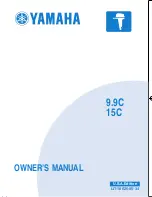
AD9510/PCB
Rev. 0 | Page 4 of 28
SETTING UP THE EVALUATION BOARD
POWER SUPPLIES
The AD9510 evaluation board has four distinct power domains:
AVDD, DVDD, VCC_USB, and V_OSC/VCP. Shown in Table 1,
these domains provide power to the analog and digital portion
of the AD9510, the charge pump in the PLL and VCO/VCXO,
as well as USB communication circuitry. These four domains do
not require four distinct power supplies however, as the analog,
digital, and USB domains always run at 3.3 V. The VCO/VCXO
and charge pump domain can run at 3.3 V to 5.0 V, depending
on the requirements of the VCO/VCXO.
Table 1. Power Supply Domain Descriptions
Name Voltage
Description
AVDD 3.3
V
Provides power to the analog portion
of the AD9510.
DVDD 3.3
V
Provides power to the digital portion
of the AD9510.
VCC_USB 3.3
V Provides power to the USB circuitry on
the evaluation board.
V_OSC/VCP 3.3
V/5
V Provides power to the charge pump
in the on-chip PLL and the external
oscillator.
Connect the power supplies to the AD9510 evaluation board
using the 4-pin connector (TB2) on the upper left-hand side of
the board. This connector has pins for AVDD, DVDD,
VCC_USB and GND.
The V_OSC/VCP power supply connection is through an SMA
connector, J21.
USB AND PC VS. MANUAL CONTROL
The AD9510 evaluation board has two options available to
program the part. The first is a PC-controlled USB connection
using the evaluation software provided with the evaluation
board. The second is using the I/O header pins to program the
part manually.
Configuring the Evaluation Board for PC Control
(Default Setup)
To use the evaluation software and USB connection, the
evaluation board must be configured for PC control. This is
accomplished by connecting two jumpers. First, W29, located
next to the I/O header, must have a jumper. Next, W3 must
have a jumper on the PC side (right) of the connector. With
those two jumpers in place, the board is configured for PC
control through the USB connection. This is the default
configuration for the AD9510 evaluation board.
Configuring the Evaluation Board for Manual Control
To program the part manually through the I/O header, the
evaluation board must be configured for manual control. This
is accomplished by connecting two jumpers. First, W29, located
next to the I/O header must be empty (no jumper). Next, W3
must have a jumper on the manual side (left) of the connector.
With this configuration, the board is ready for manual control
through the I/O header.
CLOCK INPUTS
Table 2 shows the three clock inputs on the evaluation board:
REFIN, CLK1, and CLK2. REFIN is the reference clock for the
PLL, CLK1 is a clock distribution input, and CLK2 is the
oscillator input for an external VCO or VCXO. If the on-chip
PLL frequency synthesizer and external VCO/VCXO is not
used, CLK2 can be used as an additional clock distribution
input. Each of the three AD9510 clock inputs is differential.
However, the AD9510 evaluation board is configured for single-
ended inputs.
Table 2. Clock Inputs and Functions
Clock Input
Function
REFIN
Reference Frequency for PLL
CLK1
Clock Distribution Input 1
CLK2
Clock Distribution Input 2;
External Oscillator Input for PLL
Single-Ended Input Configuration
The REFIN, CLK1, and CLK2 inputs are connected via
single-ended SMA connectors. However, each of these inputs
is converted from single-ended to differential by means of a
balun before driving the AD9510 inputs differentially.
Driving CLK2 with an External VCO/VCXO
It is important to remember that when a VCXO is being used,
the CLK2 SMA connection must be electrically disconnected
from the part. In that case, the VCXO output is used as the
CLK2/CLK2B input to the AD9510.
When a VCO is used, the CLK2 input must be connected to the
VCO output by soldering a 0 Ω resistor at R9. It is also
important to remember that while you can view the VCO
output through the CLK2 SMA, driving a signal into the CLK2
SMA while the VCO is running is not recommended.




































